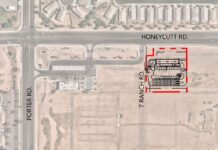Arizona has joined Wisconsin and other states in the struggle over public employee pensions. The State Senate recently passed a bill to reduce some pension benefits for public employees and require higher contribution levels.
SB 1609 would stop the “double dipping” of retirees who return work, collecting both paycheck and pension. It would also increase contributions of employees from 7.65 percent of their pay to 11.65 percent. New hires would eventually be paying 13.65 percent into the pension fund.
Pushing back age requirements for retirement is another major component of the Senate bill, as it would set a new minimum age or number of years worked before an employee can receive benefits. The bill would require employees to work 25 years to achieve “normal” retirement.
The House is considering a similar bill, Speaker Kirk Adam’s version of Pension Reform, HB2726. Both bills would apply to four statewide programs: the Arizona State Retirement System, Corrections Officer Retirement Plan, Elected Officials’ Retirement Plan and Public Safety Personnel Retirement System, which have a total membership of 360,000 employees and retirees.
Arizona hasn’t been alone in its attempts to cut pension benefits. Legislators and union organizations across the nation have been debating the matter, with Wisconsin being the most notable with its Republican, “Budget Repair Bill”, that takes away public employees rights to collectively bargain. Even in neighboring California, a Democratic governor is facing the realities of reform. According to California’s Little Hoover Commission, an independent fiscal committee, the combined funding of pension liabilities for the top 10 benefits systems in the state came up $240 billion short in 2010.
State Senator Steve Smith (R-Maricopa) commented on the reform efforts in Arizona, “Everyone was brought to the table on this. We worked with cops, firefighters, and everyone affected – I don’t see this as a Republican or Democrat issue. It’s not perfect but I think it’s a fair compromise.”
Roman Ulman, Executive Director for Arizona’s AFSCME (American Federation of State, County, and Municipal Employees) confirms that everyone has been working together and doesn’t see this as a Republican vs. Democrat issue either, but states, “I see it in the bigger picture as big business vs. working American. Both parties will have constituents that will be hurt. However, if we look at the two bills, I think the Senate version is something we can live with. I think the House version is using a meat cleaver to address this, rather than a scalpel.”
According to statements published on their websites, both the Fraternal Order of Police, which represents more than 6,000 police in Arizona, and the Arizona Highway Patrol Association oppose the Senate bill.
According to the FOP, "SB 1609 is a pay cut for every police officer and fire fighter in the state. By spiking our contribution rates, the Legislature is taking money out of our pockets … again. The average public safety salary in Arizona is about $39,000 per year. We can't afford to keep losing the pay and benefits we were promised . . . SB1609 is a bad bill."
In addition to the Senate proposals, the House Bill most notably includes eliminating the Deferred Retirement Option Plan, or DROP, by January 2012 for those not already in the program. DROP provides police officers and firefighters who defer retirement large six-figure, lump-sum payouts when they finally begin collecting their pensions. The House Bill would also end cost-of-living adjustments beginning this summer, however, current ASRS retirees have not had received adjustments in five years.
SB1609 passed in committee with 21 votes out of a possible 30. Smith expects a version of the bill to be passed through for the Governor’s signature. “As it stands, without this, people may not receive their benefits. Right now, in Arizona, the system is functioning with 65 percent fundability. We have to preserve the system or there’s not going to be anything left.”
Ulman has a different view, “It’s the banks and the mortgage crisis that has caused this problem. As the market recovers, so will these pension and investment funds. It’s a matter of time and there shouldn’t be a ‘hacking’ reaction as these systems were set-up for the long term, but we are willing to make adjustments to balance the budget.”
House spokesman Paul Boyer said SB1609 could make its way to the floor early next week.

![Elena Trails releases home renderings An image of one of 56 elevation renderings submitted to Maricopa's planning department for the Elena Trails subdivison. The developer plans to construct 14 different floor plans, with four elevation styles per plan. [City of Maricopa]](https://www.inmaricopa.com/wp-content/uploads/2024/04/city-041724-elena-trails-rendering-218x150.jpg)
![Affordable apartments planned near ‘Restaurant Row’ A blue square highlights the area of the proposed affordable housing development and "Restaurant Row" sitting south of city hall and the Maricopa Police Department. Preliminary architectural drawings were not yet available. [City of Maricopa]](https://www.inmaricopa.com/wp-content/uploads/2024/04/041724-affordable-housing-project-restaurant-row-218x150.jpg)

![City looks to lower property taxes again City Manager Ben Bitter speaks during a Chamber of Commerce event at Global Water Resources on April 11, 2024. Bitter discussed the current state of economic development in Maricopa, as well as hinting at lowering property tax rates again. [Monica D. Spencer]](https://www.inmaricopa.com/wp-content/uploads/2024/04/spencer-041124-ben-bitter-chamber-property-taxes-web-218x150.jpg)











![Elena Trails releases home renderings An image of one of 56 elevation renderings submitted to Maricopa's planning department for the Elena Trails subdivison. The developer plans to construct 14 different floor plans, with four elevation styles per plan. [City of Maricopa]](https://www.inmaricopa.com/wp-content/uploads/2024/04/city-041724-elena-trails-rendering-100x70.jpg)
